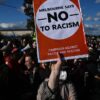Australian Prime Minister Anthony Albanese is facing scrutiny following his failure to secure two significant agreements with Papua New Guinea and Vanuatu. As he prepares to travel to the United States for the annual gathering of world leaders at the United Nations General Assembly, the delays in these key deals could complicate his diplomatic efforts.
The Albanese government has aimed to enhance Australia’s engagement in the Pacific region, especially after the prior administration faced criticism for neglecting these relationships. However, the inability to finalize a defence treaty with Papua New Guinea and a substantial investment agreement with Vanuatu raises concerns about Australia’s standing in the region.
During his visit to Port Moresby, Albanese left without the anticipated “crocodile” defence pact after the PNG government’s cabinet was unable to convene to approve the agreement. Instead of a formal signing, the two leaders issued a communique outlining the main elements of the treaty. Albanese downplayed the absence of a signed agreement, stating, “There is no downside in this whatsoever.” He expressed confidence that the pact would be finalized in the coming weeks.
In a previous meeting with Vanuatu, Albanese aimed to negotiate a $500 million deal that would grant Australia veto power over Chinese investments in critical infrastructure. This agreement also remained unconfirmed, leading to further disappointment upon his return.
James Marape, Prime Minister of Papua New Guinea, indicated that there were no significant obstacles hindering the approval process and expected a swift resolution. Despite this optimism, Albanese’s critics from the opposition have labeled the setbacks as “another embarrassment of the prime minister’s own making.” Michaelia Cash, shadow foreign minister, along with shadow defence minister Angus Taylor and shadow Pacific Islands affairs minister Jason Wood, stated that the repeated failures undermine Australia’s standing in the Pacific.
The upcoming meeting with Donald Trump adds another layer of urgency to Albanese’s diplomatic efforts. Australia is keen to advocate for its position regarding trade tariffs and strengthen its security role in the Pacific. According to Oliver Nobetau, a research fellow at the Lowy Institute, the failure to secure the PNG and Vanuatu agreements may reinforce US perceptions that Australia needs to enhance its security contributions in the region.
Nobetau noted, “This could have demonstrated that Australia and Papua New Guinea, it sees itself as a big brother, can maintain regional stability within the Pacific.” He emphasized the need for the Albanese government to reassess its diplomatic strategies to build confidence, particularly among Melanesian nations.
As Albanese prepares for his visit to the US, the outcomes of these negotiations in the Pacific will likely shape discussions regarding Australia’s role and influence in regional security.


































































